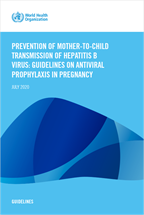Treatment of hepatitis B virus infection
WHO estimates that in 2016, 257 million people were living with chronic hepatitis B virus (HBV) infection worldwide, and 800 000 died from cirrhosis or hepatocellular carcinoma caused by HBV infection.
Chronic HBV infection can be treated with medicines, including oral antiviral agents. Treatment can slow the progression of cirrhosis, reduce the incidence of liver cancer, and improve long-term survival.
Recent WHO evidence suggests that 10% of the 257 million people living with HBV infection (26 million) might be in urgent need of treatment due to cirrhosis. A larger proportion (12 to 25%) is eligible for treatment in accordance with different guidelines (estimates vary from 10% to 40% depending on setting and eligibility criteria).
WHO recommends the use of oral treatments – tenofovir or entecavir – as the most potent drugs to suppress HBV. These treatments rarely lead to drug resistance compared to other drugs, are simple to take (1 pill a day), and have few side effects, meaning they require only limited monitoring.
Latest policy guidance
Policy brief: guidelines for the prevention, care and treatment of persons with chronic hepatitis B infection
Hepatitis B infection is caused by the hepatitis B virus (HBV), an enveloped DNA virus that infects the liver, causing hepatocellular necrosis and inflammation....
Publications

Trainers Module

Prevention of mother-to-child transmission of hepatitis B virus: Guidelines on antiviral prophylaxis...
WHO estimates that in 2015, 257 million people were living with chronic hepatitis B virus (HBV) infection worldwide, and that 900 000 had died from HBV...
Prevention of mother-to-child transmission of hepatitis B virus: guidelines on antiviral prophylaxis...
WHO estimates that in 2015, 257 million people were living with chronic hepatitis B virus (HBV) infection worldwide, and that 900 000 died from HBV infection,...
